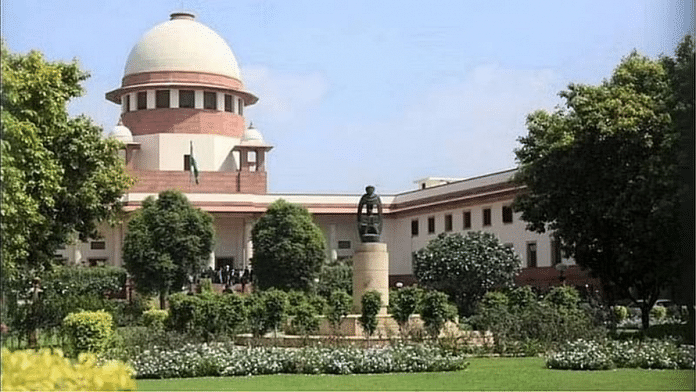New Delhi: The Supreme Court Friday held that children born out of void or voidable marriages can claim their parents’ share of ancestral property under the Hindu succession law.
But they cannot assert their rights in the share of anyone else in the ancestral property, a three-judge led by Chief Justice D.Y. Chandrachud said, adding that the judgement would be applicable to the Hindu Undivided Family (HUF) governed by Mitakshara Law.
Under the Hindu Marriage Act (HMA), a void marriage is either invalid or unlawful from the beginning and doesn’t require any formal action to terminate it. A voidable marriage is valid, but it can be cancelled if contested in court by one of the parties to the marriage.
The judgement was delivered on a reference made to a three-judge bench in 2011.
It said that a large number of cases are likely to have remained undecided due to the pending reference.
The bench then directed the Supreme Court Registrar (judicial) to immediately circulate a copy of the judgement to the HC registrars, who, after taking suitable directions, would ensure that all pending cases involving the issues decided through Friday’s judgement are listed before the appropriate bench and heard.
The bench, also comprising justices J.B. Pardiwala and Manoj Misra, referred to two provisions of HMA — sections 16(1) and 16(2), which confers legitimacy on children born out of void or voidable marriages.
A child who is legitimate under the two sections would for the “purposes of Hindu Succession Act, 1956, fall within the ambit of the explanation related by legitimate kinship” and cannot be regarded as an illegitimate child, the SC said.
Tracing the history of the Hindu Succession Act and the changes made to the law, the judgement went on to explain why children born out of void or voidable marriages can claim only their parent’s share of the ancestral property, and not any other share in the entire HUF.
It said these amendments “built upon the structure of the HUF and calibrated it to facilitate the legislative intent of bringing about gender equality.” It was done to give daughters coparcenary rights by birth in ancestral property, the bench added.
The amendments, however, did not stipulate that a child whose legitimacy is protected by the two sub-sections of Section 16 — 1 and 2 — of HMA would become coparcener by birth.
Rather, the language used in sub-section 3 of Section 16 of the HMA expressly states that conferment of “legitimacy (of the child) shall not be construed as conferring any rights in or to the property of any person other than the parents.”
The judgement said the provisions of the Hindu Succession Act have to be harmonized with the mandate in Section 16 (3) of the HMA, which indicates that a child who is conferred with legitimacy under the other two sub-sections — 1 and 2 — will not be entitled to rights in or to the property of any person other than the parents.
The judgement pointed out that the concept of a coparcenor (i.e., male family members who have birthright to take a stake in ancestral property) under the law “postulates the acquisition of an interest by birth.”
But if a person born out of void or voidable marriage, who are conferred legitimacy under the two sub-sections, were to have an interest in the ancestral property, then it would certainly affect the rights of others, apart from the parents of the child, it said.
To place such an individual on an equal footing as a coparcener would be contrary to what is postulated in the HMA under sub-section 3 of Section 16, it added.
(Edited by Tony Rai)
Also Read: Owaisi just challenged Modi to scrap Hindu Undivided Family. What it is & how it helps save on taxes



